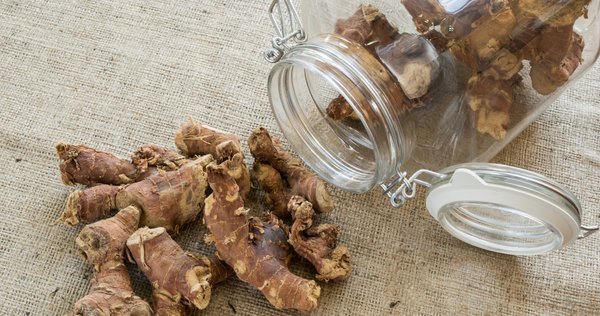
Kulanjan (Greater Galangal): 10 Benefits, Nutrients & Uses
What is Kulanjan Herb?
- Sanskrit Name: Malayvacha
- Hindi Name: Kulanjan
- English Name: Greater Galangal
- French Name: Galanga Majeur
Kulanjan, scientifically known as Alpinia galanga, is a medicinal plant that belongs to the ginger family, Zingiberaceae.
Kulanjan is native to Southeast Asia, including countries like India and Malaysia. It has been cultivated and used for various purposes in traditional medicine systems.
In Ayurvedic medicine, Kulanjan is considered to have various therapeutic properties and is used in formulations to address different health conditions.
Evidence Based Benefits of Kulanjan (Greater Galangal)
1. Digestive Health Support
Traditional uses of Kulanjan include its role in promoting digestion. It may help alleviate digestive issues and enhance overall digestive function.
2. Respiratory Conditions
Kulanjan is used in Ayurvedic formulations targeting respiratory health, with potential benefits for conditions like asthma and cough due to its bronchodilator and expectorant properties.
3. Antioxidant Activity
The plant contains compounds with antioxidant properties, contributing to cellular protection against oxidative stress and potential benefits for overall health.
4. Anti-Inflammatory Properties
The Kulanjan plant exhibits potent anti-inflammatory effects, which can aid in reducing inflammation in various tissues and may be beneficial in conditions such as arthritis.
5. Pain Relief in Rheumatism

Source: Canva
Due to its anti-inflammatory nature, Kulanjan may offer relief from pain associated with rheumatic conditions, making it a valuable component in traditional formulations for joint health.
6. Antimicrobial Effects
Kulanjan has demonstrated antimicrobial activity against certain bacteria and fungi, suggesting its potential in traditional medicine for combating infections.
7. Neuroprotective Potential
Some studies suggest that Kulanjan may have neuroprotective effects, offering potential benefits in conditions related to cognitive function and neurological health.
8. Menstrual Disorders
In traditional medicine, Kulanjan is sometimes used to address menstrual irregularities, showcasing potential Alpinia galanga medicinal uses. You can explore wide range of Ayurvedic medicines for Women.
9. Anti-Cancer Properties
Preliminary research indicates that certain compounds in Kulanjan may have anti-cancer properties, although more studies are needed to establish its efficacy in cancer prevention or treatment.
10. Immunomodulatory Effects
Kulanjan may have immunomodulatory effects, potentially influencing the immune system to function more efficiently.
Other Plants:
Kulanjan for Digestive Health Support
Kulanjan has been used to boost digestive health by stimulating digestive enzymes and improving nutrient absorption. The essential oils are responsible for carminative properties, supporting overall digestive well-being.
Kulanjan for Respiratory Conditions

Source: Canva
Kulanjan shows promise in promoting respiratory health as it functions as both a bronchodilator and expectorant.
The active ingredient believed to contribute to these effects is the essential oil, notably containing compounds such as cineole.
These components play a role in easing bronchial spasms and aiding the expulsion of mucus from the respiratory tract.
Kulanjan for Antioxidant Activity
Kulanjan benefits include its antioxidant properties, credited to bioactive compounds like flavonoids and phenolic acids.
These elements work to counteract free radicals, safeguarding cells from oxidative stress and fortifying the plant's overall health-promoting effects.
In addition to this we would also like you to check our in-depth guide where we have mentioned best ayurvedic herbs.
Nutrition Facts of Kulanjan
|
Nutrient |
Amount per 100g |
|
Energy |
38 kcal |
|
Carbohydrates |
9.62 g |
|
Protein |
0.76 g |
|
Fat |
0.04 g |
|
Dietary Fiber |
1 g |
|
Calcium |
5% |
|
Iron |
1% |
|
Vitamin B6 |
3% |
|
Vitamin C |
73% |
|
Potassium |
5% |
How Does Kulanjan Work To Improve Respiratory Health?
Its anti-inflammatory action involves inhibiting pro-inflammatory molecules, alleviating conditions like arthritis. Digestive support arises from the stimulation of digestive enzymes, enhancing nutrient absorption.
As a bronchodilator and expectorant, it aids respiratory health by relaxing airway muscles and facilitating mucus expulsion. In addressing menstrual irregularities, Khulanjan potentially influences hormonal balance. Its immunomodulatory impact may enhance immune function.
Ways to Use Kulanjan
- Powdered Form: Kulanjan root can be dried and ground into a powder for various culinary and medicinal uses.
- Herbal Infusions: Steeping Kulanjan in hot water to create herbal teas or infusions.
- Tinctures or Extracts: Preparing concentrated liquid forms for precise dosage and convenience.
- In Ayurvedic Formulations: Integrating Kulanjan into Ayurvedic concoctions or medicines for its therapeutic benefits.
- Traditional Culinary Use: Incorporating Kulanjan in recipes for its distinct flavor and potential health contributions.
Kulanjan Facts and Myths

Source: Canva
Facts About Kulanjan
- Fact 1: Kulanjan is not just a spice. It is a medicinal herb used in Ayurveda for various health benefits.
- Fact 2: Different from common ginger, Kulanjan, or Galangal, has unique compounds and distinct medicinal properties.
- Fact 3: Kulanjan is utilized in various cuisines for its aromatic and spicy flavor, contributing to both taste and health.
Other Plants:
Myths About Kulanjan
- Myth 1: Kulanjan is only a spice.
- Myth 2: All rhizomes are the same.
- Myth 3: The Alpinia plant has no culinary use.
Growing Kulanjan at Home
Plant Kulanjan in a partially shaded area with well-draining soil. Use rhizomes or root cuttings for planting, ensuring they are placed horizontally in the soil. Water consistently and harvest the rhizomes when the plant matures, typically after 8-10 months.
Where to Buy Kulanjan Products
Buy Kulanjan products from trusted brands like Zanducare to ensure quality and authenticity. Zanducare adheres to stringent standards, providing consumers with reliable and effective formulations. Ensure you purchase from reliable sources to experience the full potential of Kulanjan's health benefits.
Conclusion
In the face of the challenges of modern living, individuals encounter various health concerns. Kulanjan products emerge as a natural solution, offering relief from ailments and contributing to overall well-being.
This medicinal herb, deeply rooted in Ayurveda, becomes a holistic companion for users navigating the complexities of daily life. Whether addressing digestive issues or enhancing immunity, Kulanjan products provide a time-tested approach, promoting vitality and resilience for those seeking a balanced and healthier lifestyle.
Kulanjan FAQs
1. What is Kulanjan used for in Ayurveda?
Kulanjan is used in Ayurveda for its diverse health benefits, including digestive support and anti-inflammatory properties.
2. How can I consume Kulanjan?
Kulanjan can be consumed in various forms, such as powdered, in teas, or as extracts. Start with small amounts and adjust based on personal preferences.
3. Is Kulanjan the same as common ginger?
No, Kulanjan, or Galangal, is a distinct herb with unique compounds and medicinal properties different from common ginger.
4. Are there any side effects of using Kulanjan?
While generally safe, excessive consumption may cause mild digestive discomfort.
5. Can I grow Kulanjan at home?
Yes, Kulanjan can be grown at home. Choose a shaded location with well-draining soil and harvest the rhizomes when they mature for culinary or medicinal use.






Leave a comment
This site is protected by hCaptcha and the hCaptcha Privacy Policy and Terms of Service apply.